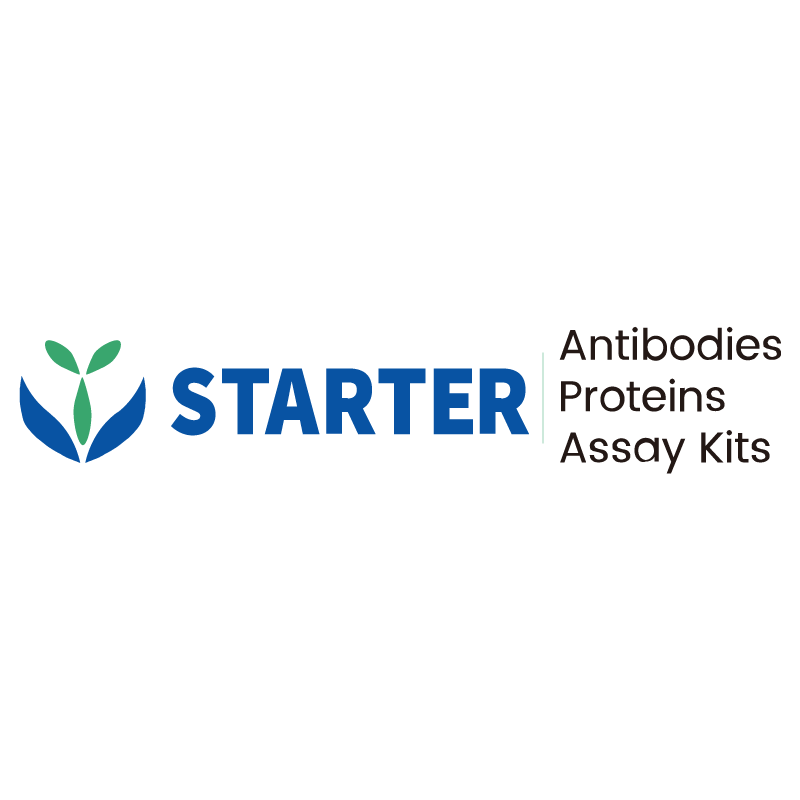Flow cytometric analysis of human PBMC (human peripheral blood mononuclear cell) labelling CD27 antibody at 1/500 (0.1 μg) dilution (Right) compared with a Rabbit monoclonal IgG isotype control (Left). Goat Anti – Rabbit IgG Alexa Fluor® 488 was used as the secondary antibody. Then cells were stained with CD3 - Alexa Fluor® 647 separately. Gated on total viable cells.
Product Details
Product Details
Product Specification
| Host | Rabbit |
| Antigen | CD27 |
| Synonyms | CD27L receptor, T-cell activation antigen CD27, T14, Tumor necrosis factor receptor superfamily member 7, TNFRSF7 |
| Immunogen | Recombinant Protein |
| Location | Membrane |
| Accession | P26842 |
| Clone Number | S-1205-49 |
| Antibody Type | Recombinant mAb |
| Isotype | IgG |
| Application | IHC-P, FCM |
| Reactivity | Hu |
| Purification | Protein A |
| Concentration | 0.5 mg/ml |
| Conjugation | Unconjugated |
| Physical Appearance | Liquid |
| Storage Buffer | PBS, 40% Glycerol, 0.05% BSA, 0.03% Proclin 300 |
| Stability & Storage | 12 months from date of receipt / reconstitution, -20 °C as supplied |
Dilution
| application | dilution | species |
| IHC-P | 1:500 | null |
| FCM | 1:500 | null |
Background
CD27 is a member of the tumor necrosis factor receptor superfamily. It is required for generation and long-term maintenance of T cell immunity. It binds to ligand CD70, and plays a key role in regulating B-cell activation and immunoglobulin synthesis. When CD27 binds CD70, a signaling cascade leads to the differentiation and clonal expansion of T cells. The cascade also results in improved survival and memory of cytotoxic T cells and increased production of certain cytokines. This receptor transduces signals that lead to the activation of NF-κB and MAPK8/JNK.
Picture
Picture
FC
Immunohistochemistry
IHC shows positive staining in paraffin-embedded human tonsil. Anti-CD27 antibody was used at 1/500 dilution, followed by a HRP Polymer for Mouse & Rabbit IgG (ready to use). Counterstained with hematoxylin. Heat mediated antigen retrieval with Tris/EDTA buffer pH9.0 was performed before commencing with IHC staining protocol.
IHC shows positive staining in paraffin-embedded human colon. Anti-CD27 antibody was used at 1/500 dilution, followed by a HRP Polymer for Mouse & Rabbit IgG (ready to use). Counterstained with hematoxylin. Heat mediated antigen retrieval with Tris/EDTA buffer pH9.0 was performed before commencing with IHC staining protocol.
IHC shows positive staining in paraffin-embedded human endometrial cancer. Anti-CD27 antibody was used at 1/500 dilution, followed by a HRP Polymer for Mouse & Rabbit IgG (ready to use). Counterstained with hematoxylin. Heat mediated antigen retrieval with Tris/EDTA buffer pH9.0 was performed before commencing with IHC staining protocol.
IHC shows positive staining in paraffin-embedded human lung adenocarcinoma. Anti-CD27 antibody was used at 1/500 dilution, followed by a HRP Polymer for Mouse & Rabbit IgG (ready to use). Counterstained with hematoxylin. Heat mediated antigen retrieval with Tris/EDTA buffer pH9.0 was performed before commencing with IHC staining protocol.
IHC shows positive staining in paraffin-embedded human prostatic carcinoma. Anti-CD27 antibody was used at 1/500 dilution, followed by a HRP Polymer for Mouse & Rabbit IgG (ready to use). Counterstained with hematoxylin. Heat mediated antigen retrieval with Tris/EDTA buffer pH9.0 was performed before commencing with IHC staining protocol.


